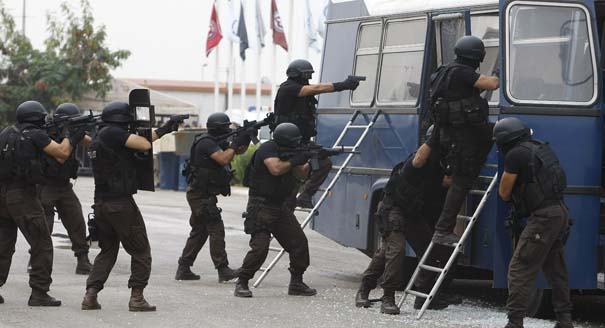Following last week’s decision by Hezbollah to bring down the government of Saad Hariri, Lebanon has entered a period of extended crisis with a caretaker government. It will be marked by fitful attempts to form a new government—negotiations on this, scheduled to begin this week, have already been postponed. A turn toward street protests or a more ominous possibility of Hezbollah using its might to settle matters in its favor cannot be ruled out.
As leaders in the country and the region try to figure out a way forward, parliament has been almost evenly split between the March 14 coalition of Saad Hariri, and the March 8 coalition, backed by Hezbollah. Druze leader Walid Junblatt holds the balance of votes in parliament, but both he and Speaker Nabih Berri have urged both sides to renew their commitment to negotiations and find a consensual way forward.
The fast-moving events reflect an intersection between the timetable of the UN-backed investigation, which is coming to a conclusion, and an insistence from the opposition that it wants a new status quo in Lebanon before the indictments come out. So far, Hezbollah and the opposition have acted within constitutional procedure; the question remains whether Hezbollah—backed by Syria and Iran—will use its power to impose a new status quo by force if constitutional means do not suffice.
In his most recent Sunday speech, Hezbollah leader Hassan Nasrallah again called the tribunal politically motivated, and said Hezbollah would reject any attempts to pin the Hariri assassination on its members. Opposition leaders have repeated that the situation before the indictments come out will be qualitatively different from the period after they come out. The March 8 coalition bolstered its claims that Hariri and the tribunal have fabricated evidence by airing recordings of Hariri meeting with one of the so-called “false witnesses” to the tribunal. The testimony of these witnesses—which later proved false—had led to early accusations against Syria and the imprisonment of four Lebanese army and intelligence generals.
As for next week’s consultations to name a new prime minister, the March 14 coalition has made clear that it will nominate Saad Hariri for another term while the opposition has said it will nominate another candidate—probably former Prime Minister Omar Karami. Junblatt’s votes might be split between the two.
Recent reports indicate that Hariri would still come out ahead in the consultation process. If he is nominated, he will probably be unable to form a government anytime soon, given the differences between himself and the opposition.
If the March 8 coalition’s nominee gains a majority, it has said that it would seek to form a government by itself, without the March 14 coalition. Such a government would immediately break all of Lebanon’s official links with the tribunal. However, domestic and regional tensions would rise immediately—the Sunni community would charge Hezbollah of taking away their representation in Lebanon’s carefully calibrated confessional system. Saudi Arabia, the United Arab Emirates, Jordan, and Egypt would react negatively. Even Qatar and Turkey have made clear that any new government should respect the outlines of the Doha agreement that ended the last crisis in 2008, which stipulated a national unity government in which all major parties and communities would feel well represented. The United States and Europe, as well as Russia and China, have all restated their support for the tribunal.
If neither candidate wins a clear majority, the president will likely ask for more time to pursue internal and external consultations.
For the time being, daily life in Lebanon remains surprisingly normal. Hezbollah’s overwhelming military force makes it unlikely that its opponents will try to challenge it on the street; however there is a growing possibility that Hezbollah could begin to use street protests and sit-ins—as it did in 2007—to put pressure on the prime minister and the international community. Stronger action by Hezbollah can also not be ruled out.
The next major shock to the system will certainly be the announcement of indictments of the international tribunal. Special prosecutor Daniel Bellemare has delivered the sealed indictments to pre-trial judge Daniel Fransen. Fransen has six to ten weeks to review the documents and decide how to proceed—including whether and when to make them public.
Nevertheless intense speculation about what the report will say continues. If the report alleges—as some news reports predict—that Iranian Supreme Leader Ali Khamenei ordered the assassination to be carried out in coordination among the Iranian Revolutionary Guards, Syria, and Hezbollah, the crisis will engulf the country and the region. Iran and Syria will effectively interpret this as a declaration of war, in which case they will abandon any talk of a “national unity” government in Lebanon and urge Hezbollah to use its power to move against the March 14 coalition and create a new political and security status quo in Lebanon.
If the indictments prove more limited, however, there would be a better chance of hammering out an agreement and putting together a coalition government.
Negotiations over a way forward are continuing, most notably with a three-way summit among Turkish, Qatari, and Syrian leaders Monday and visits by Turkish and Qatari foreign ministers to Lebanon Tuesday. Turkey has proposed a larger group to focus on the Lebanese situation, which would include Saudi Arabia, Egypt, and Iran. And President Nicolas Sarkozy of France has also proposed a contact group, to include the United States, France, Syria, Saudi Arabia, Qatar, and Turkey.
In this crisis where issues of justice, stability, and security coincide—and where a complex knot of sectarian, political, regional, and international interests intersect—the situation might get worse before it gets better. A solution appears a long way off.







